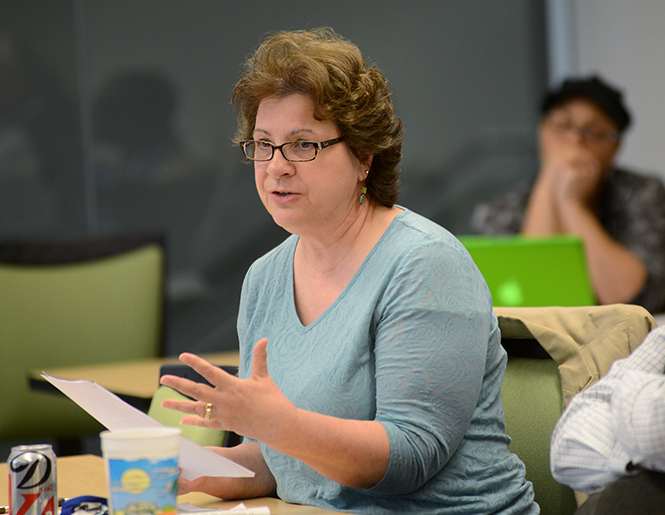JMC faculty condemn search process
The faculty of the School of Journalism and Mass Communication, or JMC, publicly condemned the presidential search process and lack of access to public records in a resolution the school’s professors signed at a faculty meeting Friday.
The resolution, signed by 28 out of 33 JMC faculty members, asks the university to immediately release all of the search’s public records under the Ohio Public Records Act, including those held by private search firm Storbeck/Pimentel & Associates that helped conduct the search.
Mark Goodman, professor and Knight chair in scholastic journalism at Kent State, wrote the resolution that objects to keeping the search a “closed process.”
“My reading of the Ohio Open Records Act is that the university is in violation,” Goodman said. “But ultimately, and I stress this, the decision must be made in court by a judge. Whether it’s an actual violation or not, it certainly is an abdication of the university’s responsibility to operate in the open and make people on campus and off to be more aware of the situation.”
The resolution is addressed to the Kent State Board of Trustees; the presidential search committee; Faculty Senate, Stan Wearden; dean of the College of Communication and Information; and JMC director Thor Wasbotten.
The resolution also urges the university to pledge that it’s future presidential searches comply with Ohio public records law and the Ohio Open Meetings Act.
“As a school committed to instilling in our students a strong appreciation for open government and the right of the press and the public to engage in effective oversight of government agencies, we believe the university’s actions are in contradiction to both those principles and the values embodied in the Ohio Public Records Act,” the resolution states.
Jan Leach, associate professor and director of the Media Law Center for Ethics and Access, said the school of JMC does not object to the actual search for the presidential candidate or the choice of Beverly Warren, provost at Virginia Commonwealth University. The faculty does object how the process was handled.
“The school of JMC teaches open access and accountability and when the university objects and disrupts that process, we can’t teach our students.”
Karl Idsvoog, associate professor of journalism and co-author of “Access with Attitude: An Advocate Guide’s to Freedom of Information in Ohio,” announced at the meeting that he and other journalism professors plan to go a step further and place an advertisement in the Daily Kent Stater to “criticize the behavior of the university.”
”The resolution is absolutely fine,” Idsvoog said. “I’ve signed the resolution. I agree with the resolution. But the resolution is not sufficient. We need to make a raw, loud public statement, and that’s why we will take out full page ad in the Daily Kent Stater.”
Idsvoog said the Akron Beacon Journal reported that Kent State signed an addendum to its contract with search firm Storbeck/Pimentel & Associates out of Pennsylvania to allow it to determine what is public record.
“That’s not how the law works,” he said about the addendum. “The legislature decides what the law is. They pass laws signed by the governor and that determines what the law is. The law determines what is public record in Ohio. Not a private firm in Pennsylvania.”
Idsvoog said at the faculty meeting Friday that the university has a history of violating Ohio public records law.
He said when Lester Lefton was hired, the university did not release its presidential search records until the Akron Beacon Journal issued a court order for them to do so.
The university has directed all comments to its legal department about the presidential search. Willis Walker, head of Kent State’s legal department, refused to comment further on the search.
Contact Madeleine Winer at [email protected].
Contact Matthew Merchant at [email protected].



